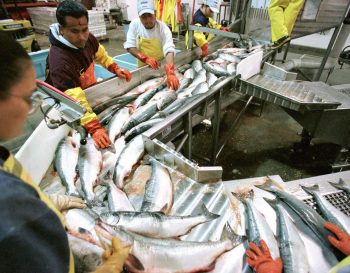Different people have different theories about what they believe. The world is flat. Elvis and sasquatch are hanging-out together. Climate change is some wonderfully organized hoax. The stock market is the reason we have awareness and life. Everyone is welcome to their own “opinion” (verses the available science) – that doesn’t necessarily mean that their theory is correct and supported.
Due to complex and far-reaching life cycles – everyone has theories about fish – some theories are well supported by data – some are not. Ocean/marine survival issues are well documented and supported by many years of data over large geographic areas and through many studies, researchers, and science.
Just living near a waterbody does not necessarily give a person the data crucial to understand the complex interactions and potential impacts to fish populations. All salmon species also spend significant time in the ocean – and some species only briefly use freshwater for spawning. Generating data at different scales and specifically to fill-in gaps in that understanding of complex interactions and potential impacts is where that understanding is developed.
I don’t think anybody has suggested that water quality (fresh and salt) is unimportant to fish. That “quality” however – has numerous and complex interacting variables including DO, pH, nutrients, plankton, upwelling, turn-over, etc. – the list is long.
The changes in marine survival, however – has affected all species at some points in time from many watersheds – more so in the past 20 years or so.
In the case comparing juvenile survival between GCL and Sproat – both have likely been affected by reductions of survival in the marine environment - as numerous posters have pointed-out It also appears that in addition to those marine survival reductions – GCL has additional issues within the lake catchment basin verses Sproat.
Everyone has their pet theories here, as well.
Maybe logging around the lake has caused increases in drought/floods which are crushing eggs and fry in the gravels. Maybe there isn’t enough plankton production in GCL verses Sproat – so they have initiated a nutrient seeding program in GCL (which is strange to me that someone who supposedly knew the lake never mentioned this). Maybe Sven’s wife believes that an IHN outbreak caused this lowered survival in the lake. Maybe it is a combination of all the above, and other not-yet researched issues.
In any event – these potential additional issues do not mean that ocean survival is not an issue.
Even wrt science – there are ways to objectively test how much and how well the data matches and supports a theory(eg. power analysis, multivariate stats, etc) Talking to a guy named Sven that you desperately wish to believe - or releasing a couple of fish does not generate the type of data to take someone’s pet theory seriously.
W/o data – that’s what non-scientific beliefs are – pet theories.
I’ll believe the available science thanks – and maybe change my mind as the data comes in - rather than adopt any one particular pet theory.



